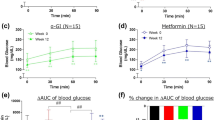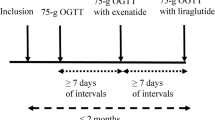Abstract
Aims
Several studies indicated that short-term administration of α-glucosidase inhibitors (α-GIs) significantly reduces postprandial glucose-dependent insulinotropic polypeptide (GIP) secretion. However, little is known about the long-term effect. We investigated the effects of long-term miglitol administration on GIP secretion and body weight in patients with type 2 diabetes.
Methods
This study included ten patients with type 2 diabetes administered 150 mg miglitol and another ten patients treated with glinide. We evaluated postprandial GIP, plasma glucose, insulin and triglyceride levels at baseline and after 12 months of each administration.
Results
After 12 months, postprandial glucose levels significantly decreased in each group. Miglitol significantly suppressed postprandial plasma insulin levels at 30 min compared to glinide (97.9 vs. 257.3 pmol/l; P < 0.01). The fasting GIP level in the glinide group after 12 months significantly increased compared to before administration (15.5 vs. 24.5 pg/ml), but miglitol did not affect the fasting GIP level. Miglitol significantly reduced postprandial GIP levels at 30, 60 and 120 min (28.8, 45.3 and 42.4 vs. 137.4, 130.8 and 108.7 pg/ml; P < 0.01, P < 0.05, P < 0.01) and the delta area under the curve of GIP (12M−0M) (−70.8 vs. 57.2 pg min/ml; P < 0.05) compared to glinide. Miglitol significantly decreased postprandial triglyceride levels, but glinide did not. Miglitol slightly reduced body weight (−0.6 kg) and waist circumference (−1.0 cm); however, glinide slightly increase body weight (+0.4 kg) and waist circumference (+0.6 cm).
Conclusions
We conclude long-term miglitol administration suppressed postprandial GIP secretion, in association with improvements in body weight, postprandial blood glucose, insulin and triglyceride levels.




Similar content being viewed by others
References
Chiasson JL, Josse RG, Gomis R, Hanefeld M, Karasik A, Laakso M, STOP-NIDDM Trail Research Group. Acarbose for prevention of type 2 diabetes mellitus: the STOP-NIDDM randomised trial. Lancet. 2002;359:2072–7.
Narita T, Katsuura Y, Sato T. Miglitol induces prolonged and enhanced glucagon-like peptide-1 and reduced gastric inhibitory polypeptide responses after ingestion of a mixed meal in Japanese type 2 diabetic patients. Diabet Med. 2009;26:187–8.
Lee A, Patrick P, Wishart J, Horowitz M, Morley JE. The effects of miglitol on glucagon-like peptide-1 secretion and appetite sensations in obese type 2 diabetics. Diabetes Obes Metab. 2002;4:329–35.
Yamada Y, Miyawaki K, Tsukiyama K, Harada N, Yamada C, Seino Y. Pancreatic and extrapancreatic effects of gastric inhibitory polypeptide. Diabetes. 2006;55:86–91.
Gault VA, McClean PL, Cassidy RS, Irwin N, Flatt PR. Chemical gastric inhibitory polypeptide receptor antagonism protects against obesity, insulin resistance, glucose intolerance and associated disturbances in mice fed high-fat and cafeteria diets. Diabetologia. 2007;50:1752–62.
Staessen J, Lijnen P, Fagard R, Verschueren LJ, Amery A. Rise in plasma concentration of aldosterone during long-term angiotensin II suppression. J Endocrinol. 1981;91(3):457–65.
Scott LJ, Spencer CM. Miglitol: a review of its therapeutic potential in type 2 diabetes mellitus. Drugs. 2000;59:521–49.
Tsujino D, Nishimura R, Taki K, Morimoto A, Tajima N, Utsunomiya K. Comparing the efficacy of α-glucosidase inhibitors in suppressing postprandial hyperglycemia using continuous glucose monitoring: a pilot study—the MAJOR study. Diabetes Technol Ther. 2011;13(3):303–8.
Emoto T, Sawada T, Yokoyama M. Effect of 3-month repeated administration of miglitol on vascular endothelial function in patients with diabetes mellitus and coronary artery disease. Am J Cardiol. 2012;109(1):42–6.
Segal P, Feig PU, Schernthaner G. The efficacy and safety of miglitol therapy compared with glibenclamide in patients with NIDDM inadequately controlled by diet alone. Diabetes Care. 1997;20:687–91.
Yoshino G. The test meal A:A pilot model for the international standard of test meal for an assessment of both postprandial hyperglycemia and hyperlipidemia. J Jpn Diabetes Soc. 2006;49:361–71.
The Committee of Japan Diabetes Society on the diagnostic criteria of diabetes mellitus. Report of the Committee on the classification and diagnostic criteria of diabetes mellitus. J Jpn Diabetes Soc. 2010;53:450–67.
Somogyi M. Insulin as a cause of extreme hyperglycemia and instability. Week Bull St Louis Med Soc. 1938;32:498–510.
Arakawa M. Miglitol suppresses the postprandial increase in interleukin 6 and enhances active glucagon-like peptide 1 secretion in viscerally obese subjects. Metabolism. 2008;57:1299–306.
Hücking K, Kostic Z, Pox C. α-Glucosidase inhibition (acarbose) fails to enhance secretion of glucagon-like peptide 1 (7–36 amide) and to delay gastric emptying in type 2 diabetic patients. Diabet Med. 2005;22:470–6.
DeLeon MJ, Chandurkar V, Albert SG, Mooradian AD. Glucagon-like peptide-1 response to acarbose in elderly type 2 diabetic subjects. Diabetes Res Clin Pract. 2002;56:101–6.
Kato T, Inoue T, Node K. Postprandial endothelial dysfunction in subjects with new-onset type 2 diabetes: an acarbose and nateglinide comparative study. Cardiovasc Diabetol. 2010;9:12.
Kawamori R. Asymptomatic hyperglycaemia and early atherosclerotic changes. Diabetes Res Clin Pract. 1998;40:S35–42.
Hiki M, Shimada K. Single administration of α-glucosidase inhibitors on endothelial function and incretin secretion in diabetic patients with coronary artery disease. Circ J. 2010;74:1471–8.
Shinozaki K, Suzuki M, Ikebuchi M, Hirose J, Hara Y, Harano Y. Improvement of insulin sensitivity and dyslipidemia with a new alpha-glucosidase inhibitor, voglibose, in nondiabetic hyperinsulinemic subjects. Metabolism. 1996;45:731–7.
Ebert R, Creutzfeldt W. Decreased GIP secretion through impairment of absorption. Front Horm Res. 1980;7:192–210.
Ginsberg HN, Illingworth DR. Postprandial dyslipidemia: an atherogenic disorder common in patients with diabetes mellitus. Am J Cardiol. 2001;88:09–15.
Ogawa S, Takeuchi K, Ito S. Acarbose lowers serum triglyceride and postprandial chylomicron levels in type 2 diabetes. Diabetes Obes Metab. 2004;6:384–90.
Narita T, Yokoyama H, Yamashita R, Sato T, Hosoba M, Morii T, Fujita H, Tsukiyama K, Yamada Y. Comparisons of the effects of 12-week administration of miglitol and voglibose on the responses of plasma incretins after a mixed meal in Japanese type 2 diabetic patients. Diabetes Obes Metab. 2012;14(3):283–7.
Conflict of interest
We do not have any conflict of interest to disclose.
Author information
Authors and Affiliations
Corresponding author
About this article
Cite this article
Sumi, K., Ohkura, T., Yamamoto, N. et al. Long-term miglitol administration suppresses postprandial glucose-dependent insulinotropic polypeptide secretion. Diabetol Int 4, 190–196 (2013). https://doi.org/10.1007/s13340-013-0116-0
Received:
Accepted:
Published:
Issue Date:
DOI: https://doi.org/10.1007/s13340-013-0116-0




